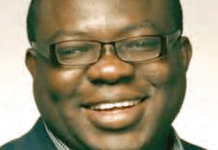 In a world where the ravages of cancer continue to cause wanton suffering and losses, the question on the minds of many who have been affected, whether directly or indirectly, by the scourge is: When will it all end? For this reason, many scientists globally have been working relentlessly to curb the carnage of cancer and it is a delight to know that one of those who have made the most phenomenal contributions towards the defeat of disease so far, is our very own Prof. Samuel Achilefu, the inventor of the ground-breaking cancer-goggles.
In a world where the ravages of cancer continue to cause wanton suffering and losses, the question on the minds of many who have been affected, whether directly or indirectly, by the scourge is: When will it all end? For this reason, many scientists globally have been working relentlessly to curb the carnage of cancer and it is a delight to know that one of those who have made the most phenomenal contributions towards the defeat of disease so far, is our very own Prof. Samuel Achilefu, the inventor of the ground-breaking cancer-goggles.
To understand the extent of revolution that Prof. Achilefu has triggered in the fight against cancer and the relief he has brought to his fellow scientists, cancer specialists, as well as cancer patients globally, a brief analysis is necessary.
A walk in the dark
Ordinarily, finding a single cancer cell in the human body is as difficult as finding a needle in a haystack. However, cancer cells often group together to form tumours, which, even at that, can be only be detected by high-tech diagnostic imaging equipment. Surgery is one of the most effective methods of removing cancerous tumours. But then, this form of treatment also presents some challenges as it is sometimes nearly impossible for surgeons to tell where a cancer tumour ends and a healthy tissue begins even under high magnification.
That aside, it is also worth noting that before surgery is done, imaging tests involving ophisticated machines can create detailed pictures of the location of cancer tumours in a patient, but for many surgeons, when the patient is in the operating room, it is like walking in the dark. Well, that was until the invention of the cancer-visualising glasses, otherwise known as “cancer goggles”, by Prof. Samuel Achilefu, a Professor of Radiology, Biomedical Engineering, Biochemistry, and Molecular Biophysics.Finding the invisible
Prof. Achilefu’s rise to prominence in the scientific world began with a simple phrase – “what if?” – after seeing surgeons being frustrated about their inability to completely remove cancer tumours during surgery. “I thought, what if we create something that lets one see things that aren’t available to the ordinary human eye…?” Achilefu stated during an award acceptance speech at the Eric P. Newman Education Centre in St Louis.
Prof. Achilefu and his team would spend the next five years developing the imaging technology in cancer diagnosis into a wearable night vision-like goggles, so that surgeons could see the cancer cells while operating. The glasses help to distinguish between malignant cells and normal cells, ensuring that no stray tumour cells are left behind during surgery.
The team also discovered a way to exclusively make cancer cells fluorescent (glow), using fluorescent markers making the cancer cells detectable by the visualising goggles. This innovation reduces the need for additional surgical procedures, and the subsequent stress on patients, as well as time and expenses.
Using the cancer visualising goggles require two steps in surgical cancer treatment. First, an infrared fluorescent marker is injected into the patient’s bloodstream. The peptides contained in the marker enable it to selectively locate cancerous cells and buries itself inside. After some hours surgeon would begin the operation, inspecting tumours under infrared light that reacts with the fluorescent marker, causing the cancer cells to glow from within when viewed with the goggles.
Recognitions
Prof. Achilefu has been variously honoured for his ground-breaking efforts. In 2014, he was given the prestigious St. Louis Award. Two years later, he became the first recipient of the Breast Cancer Research Programme Distinguished Investigator Award, a $4.5 million grant from the U.S. Department of Defence, for his research efforts in using UV light, which is invisible to the naked eye, and a photosensitive chemotherapy drug and the body’s immune system to target and obliterate breast cancer cells.
This landmark approach operates with the principle that when certain drugs are exposed to UV light, they break down, giving off toxic radicals that kill the cancer cell from within. The implication of this is that oncologists do not have to give a chemotherapy dose that is very toxic to patients; rather, they can give a dose that only becomes toxic when inside a cancer cell. The work, known as photo-immunotherapy, has finished basic stages and is in animal model testing.
Family background
Born to Nigerian parents in 1963, his father worked with hospitals and clinics in northern Nigeria, until the civil war broke out. He was about five years old then when his family were forced to move from Northern Nigeria to the south east, leaving all they had to start life anew.
Achilefu had his primary and secondary education in “some village schools” in southeast Nigeria, but was fortunate to be one of five students to win a French government scholarship to attend graduate school in France, where he received a PhD in molecular and materials chemistry at the University of Nancy. He had his post-doctoral studies at Oxford University, training on the “interface between chemistry and haematology, working on developing blood substitutes”.
Prof Achilefu moved from Oxford to St. Louis, US in 1993 to join the nascent Discovery Research Department at Mallinckrodt Medical Inc. In 2001, he joined Mallinckrodt Institute of Radiology at Washington University. He is currently a Professor of Medicine at Washington University School of Medicine, division of radiological sciences and a co-director at Alvin J. Siteman Cancer Centre for Oncologic Imaging Programme. He is also the director of Optical Radiology Lab (ORL) at Washington University in St. Louis.
He is married to Nnena Achilefu, and they are blessed with two children.
Research Interest
Prof. Achilefu’s research interest areas include: molecular optical imaging of tumours and angiogenesis, as well as the design and development of new molecular probes and nanomaterials for imaging the expression of aberrant genes, proteins, and other pathophysiologic processes. He is also interested in specific delivery of imaging agents and drugs to target cell organelles or tissue.











